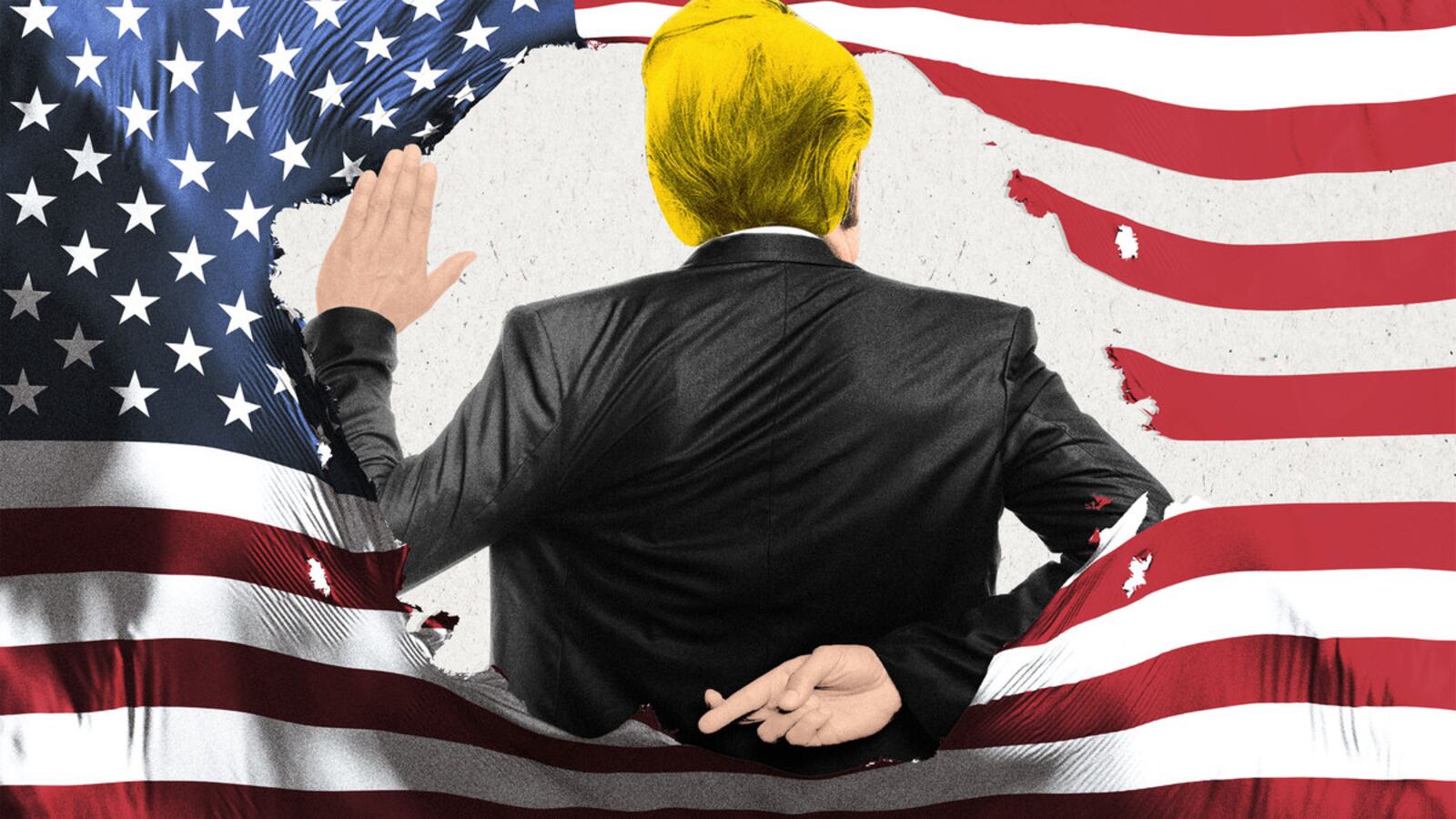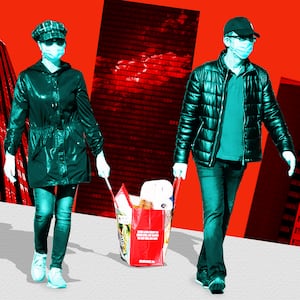The expression is repeated over and over again, from politicians to Hollywood stars to earnest television anchors: “We’re all in this together.” But we are not. Glaringly, we are not. The phrase, said with a misty-eyed pride in all-leveling unity, is not reflected in reality.
First, look at those whom coronavirus has so far disproportionately affected: people of color and the poor. The world on the streets is visibly split between the masked and unmasked, those who are social distancing and those who are not, states that are open and states that are closed, people applauding nurses, and demonstrators shouting furiously at them. A survey released yesterday revealed a huge disparity between what Republican and Democrat voters think it is safe to do in lockdown.
We are far from all in this together, and telling us that we are is a feel-good rhetorical Band-Aid.
Lady Gaga told Jimmy Fallon that while she liked the sentiment, one had to acknowledge the disparity of wealth and privilege. “I… think that the fight that I’m in—or that you’re in, right?—is very different than the fight of a woman that is in, perhaps, an abusive relationship and has a child and lost her job and can’t feed her kid and can’t feed herself and also can’t get the help that she needs because she’s in a violent situation.”
“We’re all in this together,” said Gaga, was “a tricky statement because… I want to honor that that woman is not in the same fight that I’m in, and I want to help her fight that fight.”
The irony is, stripped of its rosy-hued optimism, “We’re all in this together” is true. The barest meaning of that statement remains a blunt fact. We are all living in this pandemic world. But many are recoiling at embracing the statement’s misty-eyed implication—that we should work together to further the social good.
We should all “be in this together,” but the truth is people are following the lead of their choice of political leader: those who want a return to a semblance of normal life, and are now going out into the world to continue with whatever they want to do, and those—concerned that a lessening of restrictions like social distancing will lead to more infections—who are still following scientific advice, wearing masks, and not gathering en masse.
Bethany S. Mandel, editor of conservative site Ricochet, tweeted Wednesday, “You can call me a Grandma killer. I’m not sacrificing my home, food on the table, all of our docs and dentists, every form of pleasure (museums, zoos, restaurants), all my kids’ teachers in order to make other people comfortable. If you want to stay locked down, do. I’m not.”
Mandel then followed this with: “Doesn’t mean it won’t be done responsibly but I am just. I am done. I feel lied to about the terms of this lockdown and I regret ever trusting that it would be done responsibly.”
The actor Anthony Rapp responded, calling Mandel’s view “monstrous.” The writer Rebecca Fishbein told Mandel: “Opening up museums, zoos, restaurants, and schools doesn’t just put ‘Grandma’ at risk. It puts staff at risk. You want people to sacrifice their own health and survival to serve you because you’re bored.”
Mandel isn’t alone, as the pictures of those not social-distancing and not wearing masks in public spaces show. This is a world pissed off with being locked down, and some wish to impose that frustration on everyone else by doing just as they damned well please—even if it puts their fellow humans in danger of infection or other injury.
Warmer days will inevitably bring more mask-less, un-socially distanced sun-bathing. A friend, out for a walk recently, had to edge around a group of motorcyclists drinking and socializing—“no masks, no social distancing”—out on the street.
On another walk, two motorcyclists sped towards her and a group of pedestrians on a street that had been cordoned off to them. “I get infuriated when I read about police cracking down on people in poor communities of color, but these guys get a free pass, out in the open, every night,” my friend said.
President Trump and Mike Pence’s determined rejection of wearing a mask—why, do they see it for some reason as a sign of weakness?—has transmitted downwards. And so we live in an inconsistently masked society; told to wear them when we are out, but not made to wear them. Impatience with the lockdown leads to acts of petty and occasionally menacing resistance, even if, as Daily Beast columnist Molly Jong-Fast noted: “Bored of social distancing is not a morally acceptable reason for killing 2 percent of the population.”
A friend in rural South Carolina last weekend saw “lots of people camping, walking around with no masks. We went out to grab groceries earlier this week and there were families out with their children wearing no kind of PPE, and they were looking at us like we were insane for wearing masks and gloves. It’s really strange. What are they thinking? ‘Let’s die slowly for really ignorant reason.’”
Americans were “all in this together,” or at least it felt like it, a few weeks ago. Mask adherence wasn’t total, but it felt—along with social distancing—more carefully observed and embraced.
But, alongside downward-trending death curves and fewer hospitalizations, coronavirus has simply become another political and social battleground—and one containing all the polarities and extremes that denotes—instead of what it should be, which is a not quickly, or easily solved public health crisis.
According to a just-released CNBC/Change Research poll, conducted in six battleground states from May 1-3, which asked people about a range of activities it was OK to do right now, 7o percent of Republicans versus 5 percent of Democrats would dine in a restaurant; 52 percent of Republicans versus 4 percent of Democrats would go to a bar; 46 percent of Republicans versus 5 percent of Democrats would fly; 40 percent of Republicans versus 2 percent of Democrats would take mass transit; and 37 percent of Republicans versus 2 percent of Democrats would attend a sporting event.
The report found that nearly all Democrats (97 percent) and most independents (66 percent) remain “seriously concerned” about the coronavirus outbreak, but only 39 percent of Republicans are.
While voters from both parties had taken on the messages around masks and hand-washing, Republicans, researchers found, were less likely by 45 points to wear a face mask in public, less likely by 44 points to be sheltering at home, and less likely by 33 points to be avoiding crowds.
Coronavirus has become a lightning conductor for the right, who see it as yet another imposition on their “freedoms”—and so, from masks to social distancing to mall-shopping, they will resist it, whatever the cost to their own and others’ health—hence those guns in statehouses.
A president like Donald Trump, who has no expertise in this area and who stirs division to court his political base, is—however you vote—the worst person to lead a country through a pandemic that is, at its root, absolutely apolitical.
The country should all be “in this together.” It needs to take its lead from doctors and experts in epidemiology. These people should be helping shape policy, alongside the governors of individual states as they experience the impact of coronavirus differently.
The president at this time should most effectively be operating as a team leader, a consoling and morale-boosting figurehead—as opposed to a vituperative flame thrower, speaking for his own interest. Trump’s is a dark pantomime of leadership, and it is geared to the opposite of being “in this together”—he is brazenly only interested in his own political ends, and in serving his portion of the electorate.
It returns, day to day most visibly, back to “to mask or not-mask”
The lack of public consistency in response to coronavirus is stoked by something which is universal: impatience. Most people want an end to this weird time. But some are prepared to wait for a vaccine and/or treatment, and to moderate their behavior accordingly until then, and some are not.
Time, or waiting indefinitely, is not something our have-it-now, have-it-quick, and-I-want-it-my-way society understands. Much is made of coronavirus’ echoes with previous pandemics like the Spanish Flu, but one vital difference is that it has impacted a society addicted to the exercise of personal choice rather than collective responsibility.
Technology and consumerism have feathered our individualist nests. Coronavirus has demanded something of our modern world that it recoils from: to think of others, to act in the best interest of others, and to think beyond our own walls and desires to the needs and cohesion of our communities and world around us. Who are people having dance parties thinking of; what science are those holding coronavirus-catching parties so confident in?
Coronavirus has challenged the selfish and self-obsessed to behave less selfishly, and a sizable part of the population—after an initial embrace of this challenge—is now following the lead of Trump and his acolytes in tetchily rejecting it. They want their world back, and they want it now. So, disband the White House Coronavirus Task Force. Get back in the malls. Masks/not masks: meh, see how you feel.
The result of all this could not just lead to an increase in coronavirus infection, but also a serious fraying of the social fabric.
News broadcasts keep pushing us forward to imagine what is invoked as “the world after the pandemic,” when the thornier reality is of right now. Coronavirus is moving at its own, grindingly slow speed.
That future world, at least in the short term, will not be the world those who return a “normal” want. Six feet between people in bars, more masks, possibly gloves, strict social distancing: what happens when we are back in the world, and people who do not wish to respect the new rules take their place in those spaces? More discord, and maybe worse.
It returns, day to day most visibly, back to “to mask or not-mask.” New York City is only one place very visibly divided between the masked and socially distanced and the not.
We have been asked by the governor and mayor to wear the masks when we go outside. We must wear them when we go into stores and restaurants for take-out. The latter can be controlled by venue door staff. But a walk through Manhattan reveals no uniformity when it comes to mask-wear on the streets. Even if people wear them, they sometimes graze the chin, or are slung around the neck.
Something has shifted, and that shift is reflective of national division between states unlocking and states staying locked. Our political leaders are not in this together, and that has transmitted a more general pick-and-choose green light to a weary public.
Yet, still the media and leaders cling rhetorically to the aspirational wartime tug of “We’re all in this together.” The truer statement in 2020 would be: “We should be in this together, so show it,” and it would go for political leaders and the public.
Coronavirus isn’t going anywhere. Its presence will continue to be felt in how we live, love, and work for some time, even as curves are hopefully flattened and green buds of day-to-day normalcy reappear. The ongoing trajectory and diffuse, reverberating impact of the pandemic will demand we truly engage with what “We’re all in this together” means. Siphon off its cloying self-congratulation, and there’s still time to ace the challenge. And there is still time for us to catastrophically fail it.


